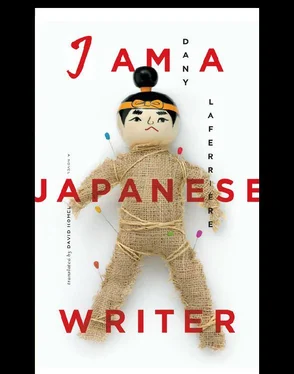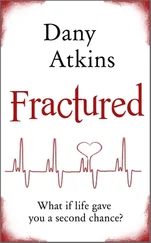“And I don’t live in Montreal, but here we are, talking to each other. What does it really mean to live somewhere?”
She was about to slip through my fingers once more.
“What do you want to know?”
“We want to see you. . We will be the first to put a face to this mystery man who has provoked such passion in Japan, and I am choosing my words carefully. I don’t want to take too much of your time… Since you don’t want us to film you where you live, tell me your favorite places.”
“Why not my favorite color?”
“I’m just doing my job. We’re looking for locations for the interview. The location says a lot.”
“It would be more interesting if you didn’t see me, but only the location.”
“Very interesting. . I’ll mention that to Dazaï. He loves everything that’s original. Excuse me, but I couldn’t help hearing a certain irony.”
“Not at all.”
“Mr. Tanizaki warned us that you would do everything to sabotage this project. At the office, we all read Basho to try to understand you. For the locations, if you could give me some ideas…”
“Everything is in the same neighborhood. There’s a park called Square St-Louis, and across from it is the Librairie du Square, and next to that bookstore there’s a café called Les Gâteries. That’s all there is.”
“That’s on Rue St-Denis, if I understand correctly.”
“You’ve been to Montreal?”
“No.”
“Then how do you know about the place?”
“A colleague told me it’s your favorite street.”
“Then you know everything there is to know.”
“I’m just joking. I’m sitting in front of my computer, and it’s showing me everything you’re saying. Someone will call you to set up the interviews.”
“What’s your name again?”
“Kero.”
“Kero, I’m going to go back to bed if you don’t mind.”
“I was warned.”
“About what?”
“That you spend your life in bed. We would love to film you sleeping.”
“That’s a private activity.”
End of conversation.
EVERYONE KNOWS THAT the camera has had the greatest success among the Japanese. I’ve long suspected them of not putting film in their cameras. Or, at least, of not looking at the photos once they return home from their trip. How can they tell the difference between the pictures they took and the ones their friends took, since they all take the same photo in front of the Eiffel Tower from the same angle with the same smile and even the same suit? In the photos, they all wear their cameras slung over their shoulders. A nation of smiling photographers. That kind of behavior must be hiding something. Maybe they’re stockpiling photos so that later they can get an idea of how we lived at the beginning of the twentyfirst century. The information would not be very diversified: billions of Japanese photos showing nothing but smiling Japanese. If one day we stumble upon these mountains of photos, we might well conclude that the earth was inhabited at the time solely by Japanese. There was not a single monument worth mentioning on this planet that they did not colonize. The conquest was worldwide. A universal point of view. If I want to become a Japanese writer, I had better rush out and buy a camera. But I think I’ll stick to my typewriter. At heart, though, it’s the same thing. You describe everything you see. I would like to be, not a photographer, but a cold, objective camera lens. To simply look at the person in front of me. Is that even possible?
AS IT TURNED out, two days later a guy called from New York to rummage through the drawers of my memory. Of course he wanted to know where an idea like mine had come from. Haruki (Murakami was his last name) confided that his father was from Louisiana, a black soldier stationed in Tokyo whom, unfortunately, he never knew. His mother was working in a big sports equipment store in the center of the city when they met. He had come in to buy a basketball. She followed him through the store because of his smell. The smell of black men drove her crazy. The spices went to her head. She could spend hours with her head tucked under his armpit. But that got on his nerves. He wasn’t a violent man, but he could become irritable.
“People talk a lot about the voice, the eyes, but rarely about smell. Yet it’s so important in the animal world. I went out with black men to try to understand my mother’s obsession. What touched me most was their skin. . Some skins are so soft. Like the skin of a mouse. When I meet a man like that, I literally melt.”
“Any man, or a black man?”
“I don’t look at any other kind of man.”
“So you’re in search of your father.”
“That’s what my mother told me. She thinks that made me into a homosexual. But I know what made me gay: a guy from Harlem, a psychopathic killer with skin as soft as a baby’s. I was the only one who knew what he’d done. I would spend hours caressing him in the darkness of an abandoned house where we hid. The mob and the cops were after him. He trusted no one except his mother and me. He used to say I was his little woman. He had to get mad to get a hard on.”
“Mad at you?”
“Not necessarily… He would fly into a rage against anyone, anything, and he took it out on me. I loved it. He would pull out his gun and tell me he was going to blow my brains out. I didn’t care as long as he fucked me. No wonder: I was in love with him.”
“He could have killed you.”
“Yet he’s the one who ended up dead. When he was killed I was in Harlem, at a friend’s place. I hadn’t seen him in a week. I missed his sweetness. Funny: the guy was violence incarnate, yet all I can remember is the softness of his skin. You can’t have skin that soft if there’s not gentleness elsewhere too. I can tell you it wasn’t always easy. .” He sighed. “I heard a gunshot that night. That was the music of Harlem. That’s what gave life its beat — they tell me it’s changed since then. I knew right away. I said to my friend, That bullet was for Malcolm. My friend bawled me out, he told me I must have been sick if I started naming everyone who was killed in Harlem during the night. He told me to go see a psychologist, the whole thing. I burst into tears and I left. I knew where Malcolm hung out, I went there and found him in a pool of blood. He died like a dog. I cleaned him up and called his father. Then I hid and waited, and I slipped away when the father showed up. I wandered for days and nights through Harlem. I wanted to get myself killed too. I did everything I could, but death wouldn’t touch me… Why am I telling you all this?”
“Because you can’t see me.”
“I can’t see a psychologist.”
“Why not?”
“I’m a fan of Woody Allen — that’s what my friends call me in Japanese. We have the same physique. He has a Japanese body. Try it yourself: take off his head and put a Japanese head on him, and you’ll get a Japanese filmmaker.”
“I’d like to ask you a question.”
“Go ahead. Otherwise I’ll just be talking to myself.”
“Your father is black, your mother is Japanese, and only black men attract you…”
“But not the same way as for my mother. My mother was smell. I’m touch. Everything is concentrated in my fingertips. The story of my life is a story of electricity. If the lines don’t light up, there’s nothing I can do. But when they do, I’m a goner. Black skin in the darkness is a foretaste of hell. That skin shines brighter than any other. And some things burn harder than fire.”
“Didn’t you ever think you were black?”
“Never.”
“But your father is black.”
Читать дальше












